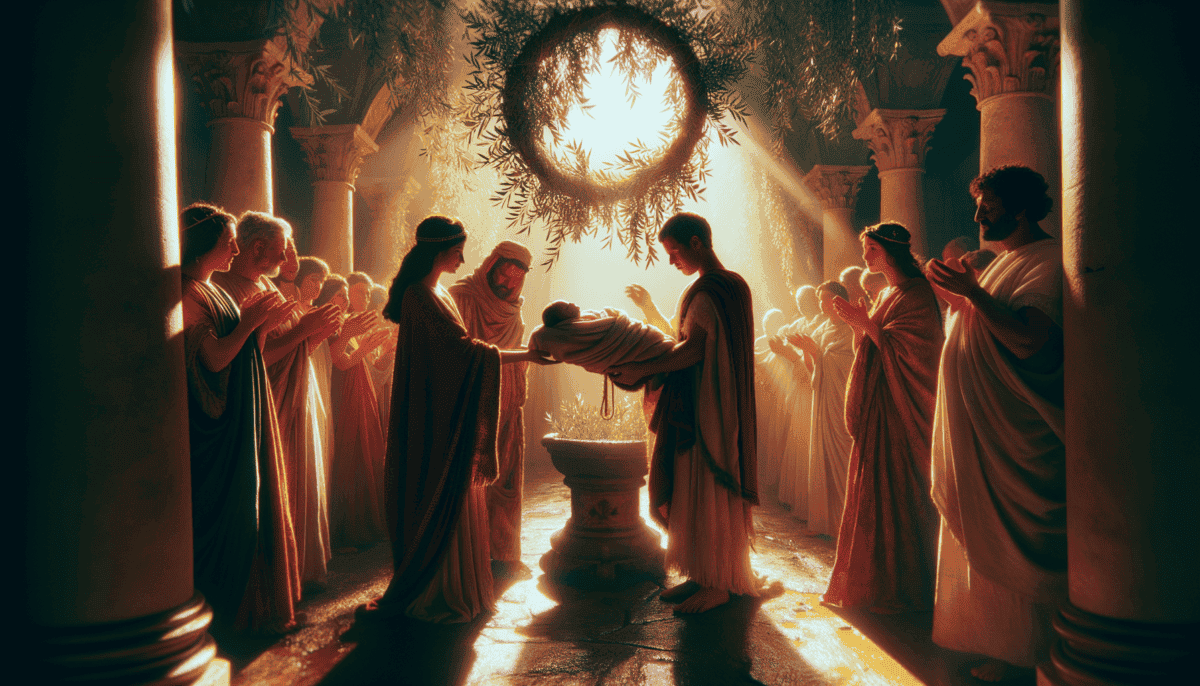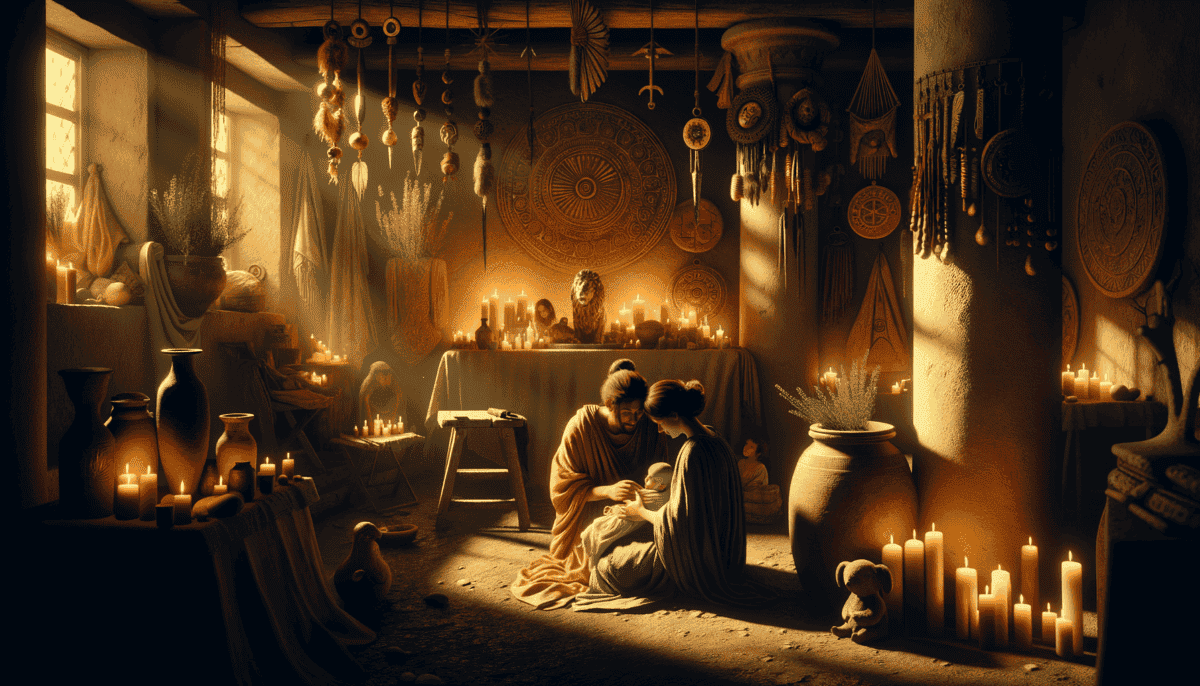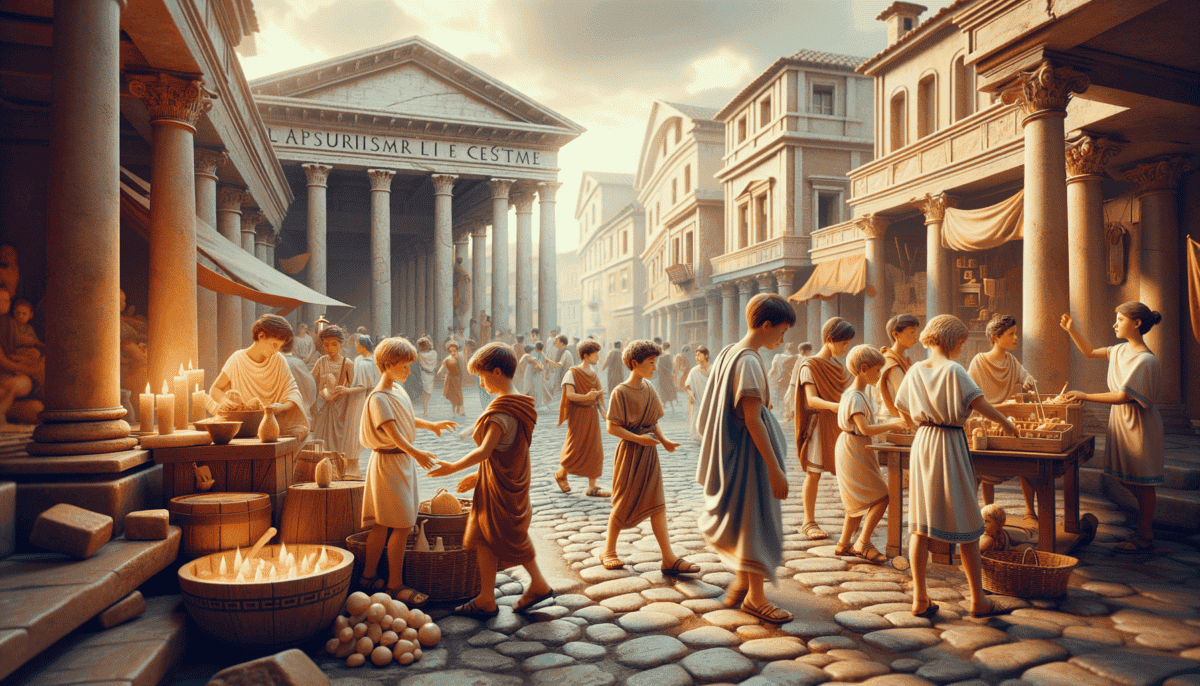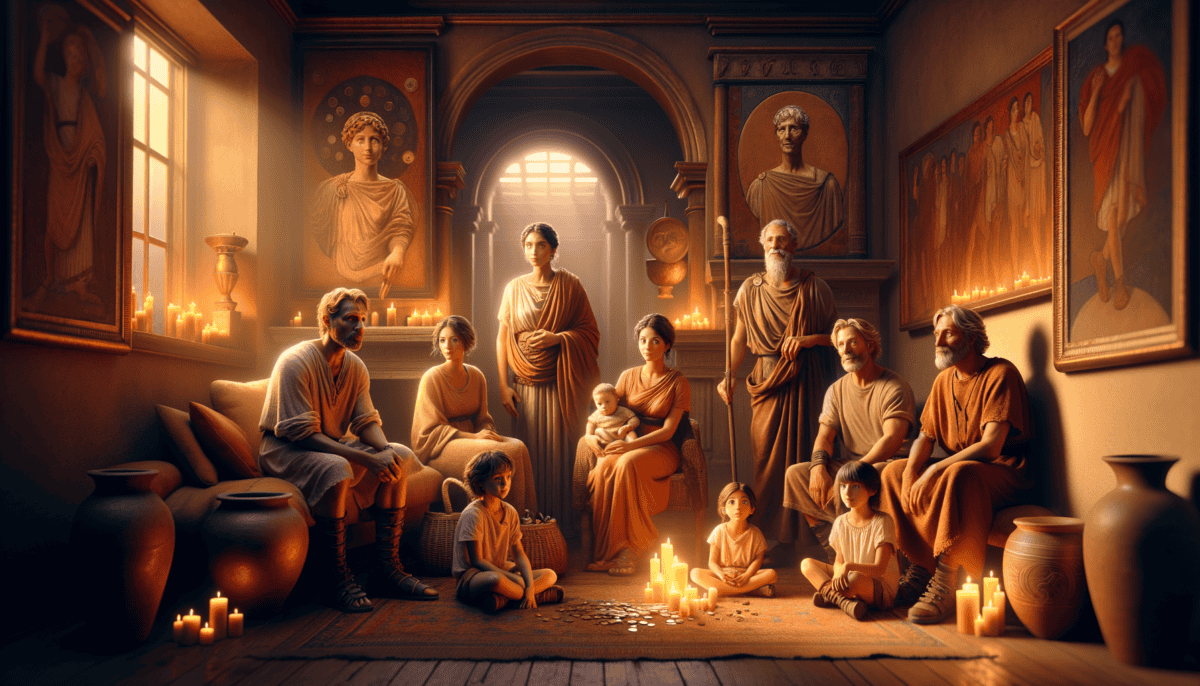The Sacred Arrival
The sun was rising over ancient Rome when Claudia felt her baby kick. She smiled and placed her hand on her round belly. In her family’s beautiful villa, she sat near the window, watching the city wake up.
Fun Fact: In ancient Rome, pregnant women were very special. People believed the goddess Juno watched over them!
“The baby is active today,” Claudia said to her mother, Tullia, who was preparing herbs in the corner.
Tullia smiled warmly. “That’s a good sign, my dear. The midwife says an active baby is a healthy baby.”
In ancient Rome, having a baby was a big deal. The whole family helped get ready. Let’s see what they did to prepare:
- Put special flowers by the door
- Made warm blankets for the baby
- Asked the gods for help
- Called the best midwife in Rome
- Prepared yummy food for the mother
The family’s trusted midwife, Helena, visited every day now. She was like a doctor who only helped with babies. Helena had helped hundreds of Roman mothers have their babies safely.
“Remember to walk in the garden each day,” Helena told Claudia. “And drink the special tea I made for you. It will make you and the baby strong.”
Claudia’s little sister, Julia, ran into the room with excitement. “Can I feel the baby kick?” she asked. Claudia nodded and guided her sister’s small hand to the right spot.
In ancient Rome, people believed that happy mothers had healthy babies. They tried to keep pregnant women cheerful and calm.
The family’s atrium was filled with small statues of Juno, the goddess who protected mothers and babies. Claudia’s father had bought the prettiest ones he could find. He wanted his grandchild to have all the blessings possible.
“When will the baby come?” Julia asked, bouncing on her toes.
“Soon,” Helena answered with a knowing smile. “The gods will decide the perfect day.”
Outside, the streets of Rome were busy. People walked past carrying fruits, bread, and flowers. Some stopped to wave at Claudia through the window. In Rome, everyone celebrated when a new baby was coming.
As the day went on, more family members arrived. Aunts brought special foods. Cousins helped clean the house. Everyone wanted to help welcome the new baby.
That night, as the stars came out over Rome, Claudia sat in her favorite chair. She could hear her family talking and laughing in the other room. The baby kicked again, and she whispered softly:
“Little one, you will be born into so much love. All of Rome is waiting to meet you.” ⭐
The candles flickered as a warm breeze came through the window. Tomorrow would bring another day of preparation. In ancient Rome, every detail mattered when waiting for a new baby to arrive.
Sacred Protection
The big day was getting closer. Helena, the wise midwife, came early to set up the special birth chair. It was made of strong wood and had been used to welcome many Roman babies into the world.
Important: The birth chair was very special in ancient Rome. It helped mothers feel safe and comfortable.
“Look what I brought,” Helena said, pulling out a small red bag. Inside were special stones and herbs that Romans believed kept bad spirits away.
Claudia watched as her mother and Helena worked together. They hung garlands of protective herbs around the room:
- Rosemary for good luck
- Lavender for calm feelings
- Sage to keep evil away
- Rose petals for love
- Bay leaves for strength
“Now we must paint the door red,” Helena announced. Red doors told everyone a baby was coming. It also asked the gods for protection.
“When I was born,” Tullia told Claudia, “your grandmother painted our door the brightest red in all of Rome!”
Julia helped paint the door, getting more paint on herself than the wood. Everyone laughed, even Claudia’s father, who was usually very serious.
Romans believed that happy sounds during birth preparations brought good luck to the baby.
Helena brought out a special birth necklace. It had tiny bells that made gentle sounds. “The music will help guide your baby,” she explained, placing it around Claudia’s neck.
“What else do we need to do?” Julia asked, still covered in red paint.
Helena smiled and said, “Now we must sing the special songs.” In Rome, these songs were very old. Mothers had sung them to their babies for hundreds of years.
“Sweet baby, come safely,
Through Venus’s golden gate,
All Rome awaits you,
It’s never too late.”
As they sang, more women from the neighborhood joined in. Soon the room was full of singing voices. This was how Roman women supported each other when babies were coming.
The sun started to set, painting the sky in beautiful colors. Helena arranged special birthing tools on a clean cloth:
• A silver bowl for water
• Soft cloths for the baby
• Special oils for comfort
• A tiny pair of scissors
“Everything is ready now,” Helena said proudly. “The gods will be pleased with our preparations.”
That night, Claudia dreamed of her baby. In her dream, all the protective spirits of Rome watched over them. The red door kept them safe, and the herb garlands filled the air with sweet smells.
As she slept, the tiny bells on her necklace made soft music in the night breeze. All of Rome seemed to be holding its breath, waiting for the special moment when a new life would join their ancient city.
A Name for Life
The morning sun peeked through the window, lighting up baby Marcus’s tiny face. It was his ninth day of life – a very special day in ancient Rome. Today was his naming ceremony, called the dies lustricus.
Claudia held her baby close, breathing in his sweet smell. “Today you get your official name, my little one,” she whispered.
Fun Fact: Roman babies didn’t get their names right away. They waited nine days for boys and eight days for girls!
The house was busy with excitement. Julia helped hang fresh flowers while Tullia prepared special cakes made with honey. The air smelled sweet and festive.
“Look what I have!” Claudia’s father called out. In his hands was something shiny and round. It was a bulla – a special necklace that all Roman children wore.
“This bulla will protect Marcus from evil spirits,” he explained proudly. “I wore one just like it when I was a boy.” ✨
The bulla was beautiful. It was made of gold because Marcus’s family was important. Inside were special charms for good luck:
- A tiny piece of wolf tooth for strength
- A special stone for health
- A written prayer for protection
- A small coin for good fortune
- A herb packet for safety
Every Roman child wore their bulla until they grew up – boys until age 16, and girls until they got married.
Guests started arriving with gifts. Helena, the midwife who helped with the birth, brought a small silver rattle. “To make him laugh,” she said with a smile.
The naming ceremony began at noon. Everyone gathered in the atrium, the main room of the house. Marcus’s father lifted him high in the air.
“I name this child Marcus Claudius Rufus,” he announced in a loud, clear voice. “May the gods bless him and protect him!”
“Marcus Claudius Rufus!” everyone repeated, welcoming the newest member of Roman society.
Claudia watched as her father carefully placed the bulla around Marcus’s neck. It seemed big on his tiny body, but he would grow into it.
His name had special meaning:
• Marcus – after the god Mars
• Claudius – his family name
• Rufus – because of his red hair
After the ceremony, everyone enjoyed the honey cakes and sweet wine. The children played games while the adults talked and laughed.
“Now you are truly a Roman citizen,” Claudia whispered to sleeping Marcus. His new bulla sparkled in the afternoon light.
As the happy day came to an end, Marcus slept peacefully in his cradle. His bulla caught the last rays of sunlight, promising protection for all the adventures ahead. Tomorrow would bring new experiences for the newest little Roman.
Living Through Hard Times
The warm summer days turned into cool autumn nights. Baby Marcus was getting bigger, but life in ancient Rome was not always easy for babies.
Important: Many Roman babies got sick because doctors didn’t know as much as they do today. But families tried their best to keep their little ones healthy.
One morning, Marcus woke up crying more than usual. Claudia felt his forehead – it was hot!
“Julia, fetch Helena the midwife!” Claudia called out, holding Marcus close. Her heart beat fast with worry.
“Don’t worry, my sweet boy,” she whispered, rocking him gently. “Help is coming.”
Helena arrived quickly, carrying her special bag of healing items:
- Cool cloths for his fever
- Honey for his throat
- Special herbs for tea
- Olive oil for rubbing
- Prayers to the healing god Apollo
Roman families used many different ways to help sick babies feel better. They mixed old wisdom with prayers to the gods.
“Let’s make him comfortable,” Helena said kindly. She showed Claudia how to wrap Marcus in cool cloths.
Tullia brought in a small bowl of honey water. “This will help his throat,” she said. “My mother used it for all her babies.”
Marcus’s father paced in the garden, asking the household gods for help. The bulla around Marcus’s neck sparkled as he moved restlessly.
Roman Healing Ways:
• Cool cloths for fever
• Honey for sore throats
• Gentle massage with oil
• Lots of rest and love
• Special prayers to the gods
For three days and nights, they took turns watching over Marcus. Helena stayed close by, showing them how to care for a sick baby.
“Keep him warm,” she advised. “Sing to him. Love helps healing.”
“The gods are watching over him,” Claudia’s father said. “His bulla will protect him.”
Slowly, Marcus began to feel better. His fever went down, and his happy smile returned. The whole family celebrated with relief!
“You are a strong Roman baby,” Claudia said proudly, kissing his now-cool forehead.
Even though times were hard, Roman families stuck together. They used everything they knew to keep their babies safe and healthy.
That night, as Marcus slept peacefully, Claudia looked at the stars through the window. She was thankful for her family, for Helena’s wisdom, and for her brave little boy.
The scary time had passed, but it taught them all how precious life was. Marcus would grow stronger, protected by love and the ancient ways of Rome.
Growing Up in Ancient Rome
Marcus was now six months old and growing stronger every day. His dark eyes sparkled with curiosity as he watched the world around him.
Fun Fact: Roman babies started learning about life very early! Boys and girls had different lessons to prepare them for grown-up life.
“Look how he reaches for the scrolls!” Claudia’s father laughed as Marcus tried to grab at the papers on his desk. “He will be a great scholar one day.”
Claudia smiled, remembering her own childhood lessons. “First, he must learn to walk and talk, Father.”
“Every Roman child has much to learn,” Helena said wisely. “The gods have given them curious minds.”
In the garden, Julia was teaching her little sister Tullia about herbs and cooking. Roman girls learned important household skills from an early age.
What Roman Children Learned:
- Boys learned reading and writing
- Girls learned cooking and weaving
- Everyone learned about the gods
- Counting and speaking well
- Good Roman manners
“Soon Marcus will learn to play with other children,” Claudia said, watching him crawl on the soft blanket. “He will make friends at the neighborhood games.”
Marcus’s father brought him a tiny wooden sword – a common toy for Roman boys. “For when you’re bigger, my son,” he said proudly.
Roman Toys: Children played with dolls, toy soldiers, balls, and little carts. They also loved playing games with nuts and stones!
One morning, Marcus surprised everyone by pulling himself up on a chair. His first time standing!
“The gods bless his strong legs!” Helena clapped. “Soon he will run through these halls!”
Claudia kept special tokens from Marcus’s early days:
• His first baby tooth
• A lock of his dark hair
• The little shoes he first wore
• Pictures drawn of him in wax
“Every day brings new wonders,” Claudia said, watching Marcus explore his world. He was learning the Roman way of life, just as countless children before him.
At night, as the family gathered for dinner, Marcus sat in his special chair, trying to copy the grown-ups. His bulla clinked softly as he moved.
“He watches everything we do,” Julia noticed. “Even the way we hold our cups!”
Growing Up Roman: Children learned by watching and copying their family. Every day was full of new things to discover!
The household gods watched over their little Roman family as they shared stories and laughter. Marcus was growing up surrounded by love and learning, just as it should be.
A Legacy of Love
The summer sun warmed the garden as Marcus, now walking steadily, chased butterflies between the columns. His laughter echoed through the courtyard, bringing smiles to everyone’s faces.
Special Moment: Marcus had grown from a tiny baby into a happy, healthy toddler. His family’s love and care had kept him safe.
“Remember when he was so small?” Claudia asked Helena, watching her son play. “Now look at him run!”
Helena nodded wisely. “The gods blessed us with strong Roman traditions to protect our little ones. Just as my mother cared for me, and her mother before her.”
“Our ways keep babies safe and help them grow strong,” Helena added. “Each generation teaches the next.”
Marcus toddled over to his father, who scooped him up high. His bulla sparkled in the sunlight, still protecting him from harm. ✨
What Made Roman Families Special:
- Strong family bonds
- Special protection charms
- Caring midwives
- Important ceremonies
- Love passed down through generations
“Julia!” Marcus called out to his cousin, showing off his new wooden horse. The two children played together just as their parents once did.
Family Time: Roman families spent lots of time together, sharing meals, stories, and love – just like families today!
Claudia thought about all the special moments since Marcus’s birth: his naming day, his first steps, his first words. Each memory was precious.
“Mother,” asked Julia, “will I have my own baby someday?”
“Yes, dear one. And you’ll know just what to do, because we’ve shown you our Roman ways of caring for little ones.”
As the sun began to set, the family gathered in the garden. Marcus sat on his father’s lap, sleepy from his day of play.
Claudia hugged Marcus close, feeling grateful for all the wisdom her family had shared. Their Roman traditions had helped her become a good mother.
“Time for bed, little one,” she whispered to Marcus. “Tomorrow brings new adventures.”
Forever Love: The love between Roman parents and children was just as strong as it is today. Some things never change! ❤️
As stars appeared in the sky, the household gods watched over the sleeping family. The ancient ways of caring for Roman babies had worked their magic once again, bringing another child safely into the world. And somewhere in Rome, another new mother was just beginning her own special journey.
Every baby born, whether in ancient Rome or today, arrives with the same need for love, protection, and care. The wisdom of Roman families still echoes through time, reminding us that a parent’s love is eternal.






